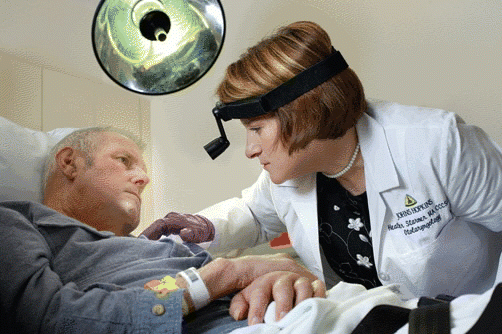PHOENIX-Performing salvage surgery after chemoradiation or radiation treatment for laryngeal cancer patients, rather than just performing primary surgery right away, appears to lead to more complications with patients’ tracheoesophageal voice prostheses, according to a retrospective study reported by researchers here.
Explore This Issue
September 2009Patients who were first treated either with radiotherapy or chemoradiation, then had salvage surgery performed later, had significantly more leakage around their prostheses, among other problems, than those who had primary surgery performed, researchers from Johns Hopkins University found during an examination of all the total laryngectomies performed at the Johns Hopkins Medical Center from 1998 to 2008.

When we looked at the number of leaks around the voice prostheses, we did find a significant difference between the groups, said Heather Starmer, MA, a speech-language pathologist who presented the findings at the American Head and Neck Society Meeting, conducted as part of the Combined Otolaryngology Spring Meeting.
A movement away from the practice of having a total laryngectomy, and then radiation therapy, prompted the study, Ms. Starmer said. For many years, the primary treatment for patients who had end-stage laryngeal cancer was total laryngectomy followed by radiation therapy, she said.
Then the tide started to change.
The Rise of Chemoradiation
In a 2006 study of the National Cancer Database, Chen et al. found that, from 1985 to 2001, use of chemoradiation as primary treatment for advanced cancer of the larynx increased from 8.3% to 20.8%. In another 2006 study of the same database, Hoffman et al. found that primary chemoradiation for all cancer of the larynx increased from 2% to 13.2%.
Studies on the effectiveness of chemoradiotherapy seem to have fueled the change in strategy.
The 1994 Veterans Affairs Laryngeal Cancer Study Group concluded that 64% of patients getting induction chemotherapy and definitive radiation therapy had retained their larynx after two years, with no decrement in two-year survival, compared with patients receiving a total laryngectomy.
The 2003 RTOG 91-11 study concluded that patients getting chemoradiation had significantly better laryngeal preservation than patients getting either just radiotherapy or induction chemoradiation therapy and then radiotherapy.
There has been a real change toward chemoradiation for treatment of these patients, Ms. Starmer said. At the same time period when we’ve seen this change in practice, we’ve also started to see, clinically, patients having an increased number of complications regarding tracheoesophageal voice prostheses [TEP], she continued. And so the question that we posed was: Could the problems that we’re seeing clinically be related to salvage surgery in comparison to the patients having primary surgery?
 The question that we posed was: Could the problems that we’re seeing clinically be related to salvage surgery in comparison to the patients having primary surgery?
The question that we posed was: Could the problems that we’re seeing clinically be related to salvage surgery in comparison to the patients having primary surgery?-Heather Starmer, MA
The Hopkins Study
A total of 174 patients were included in the Johns Hopkins analysis, including 81 who had primary surgery performed, 61 who had primary radiotherapy, and 32 who had primary chemoradiotherapy. Those who did not receive complete oncologic treatment, those who didn’t receive follow-up TEP care at Johns Hopkins, and those with a follow-up period of less than six months were excluded from the study.
Leave a Reply